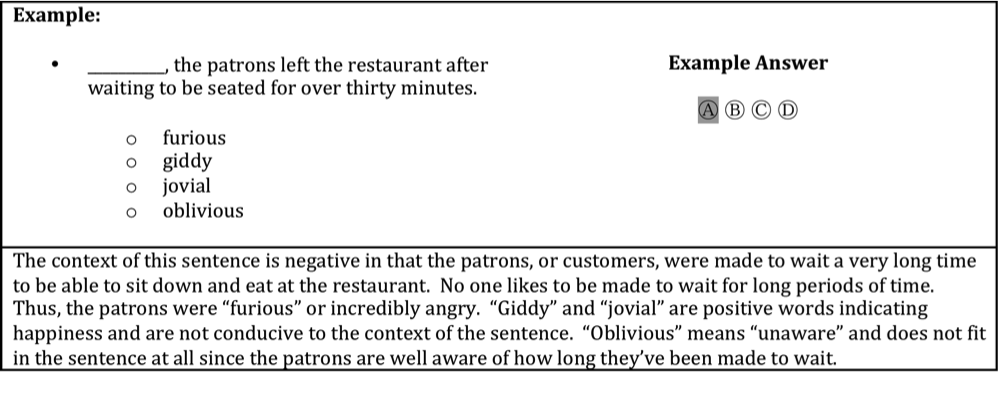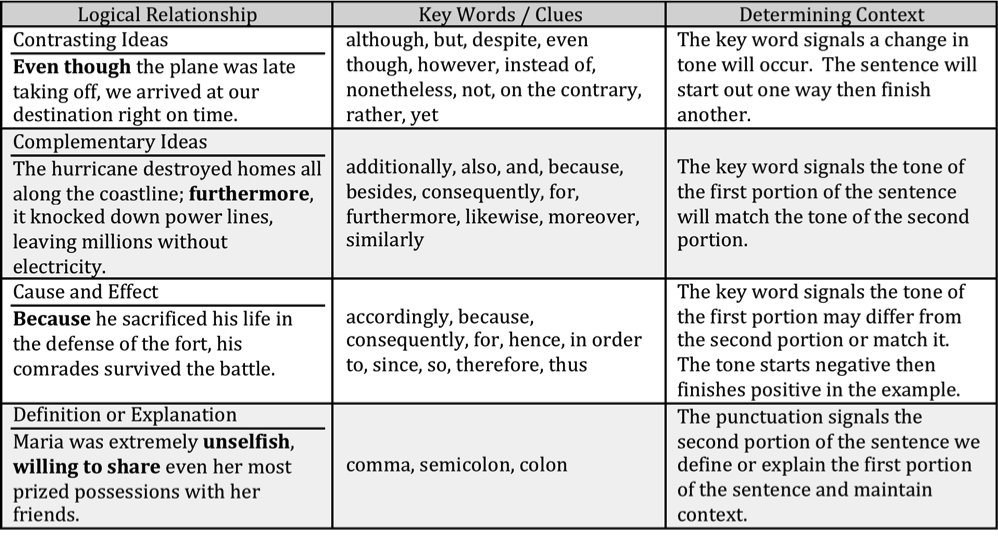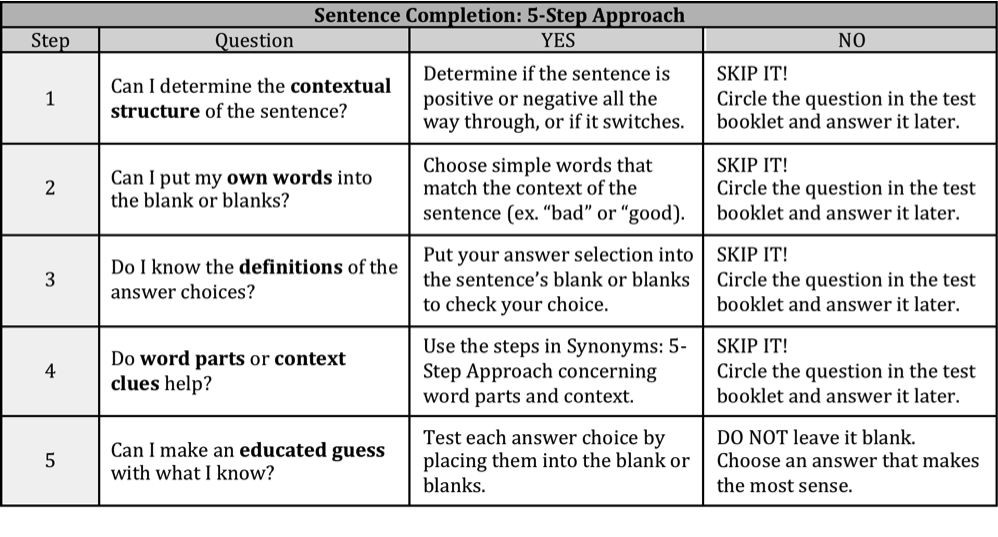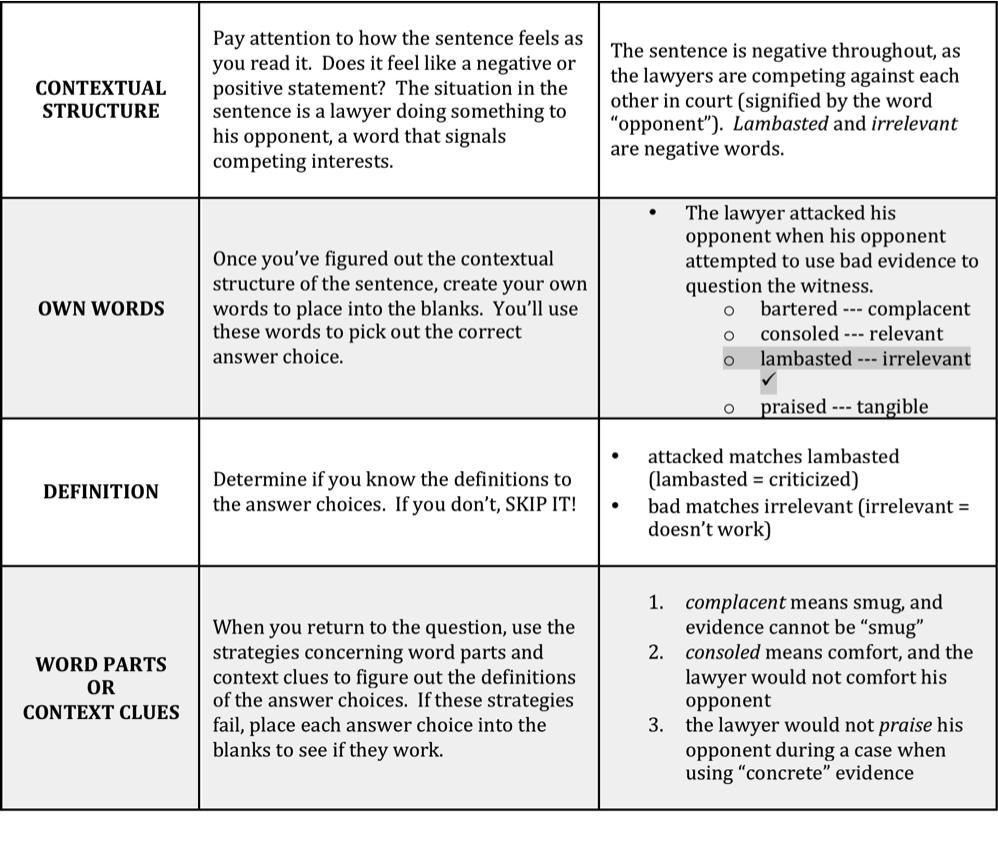The Upper Level ISEE Verbal Reasoning section is composed of two parts – synonyms and sentence completions. You will have 20 minutes to answer 20 Synonym Questions and 20 Sentence Completion Questions. These questions test your knowledge of vocabulary and your ability to apply that knowledge.
(Skip this how-to guide and go straight to a practice quiz)
For Sentence Completions, you must understand the structure of the sentence, know the definition of each answer choice, and decide whether or not each answer choice will fit within the context of the sentence’s structure.
The Design of a Sentence
While Synonym questions focus on your knowledge of words and your ability to decipher the meaning of new words, Sentence Completion questions take it one step more by asking you to apply that knowledge.
Each question will contain a complete sentence with one or two blanks. You must choose from the answer choices which word or pair of words best matches the context of the sentence.
Students who read slowly need to allot themselves more time for this portion of the Verbal Reasoning section, such as 5 minutes for Synonyms questions and 15 minutes for Sentence Completion questions.
The context of a sentence is how it conveys a thought a particular way. A sentence will convey a beneficial situation through a positive context, or a sentence will convey a harmful situation through a negative context. For example:
- Sheila earned promotion after promotion due to her astounding work ethic.
- The context of the entire sentence is POSITIVE.
- If you earn a promotion, you have shown the company you are capable of more responsibility and pay. Getting paid more is a good thing.
- Thus, we can determine “astounding” is also positive (astounding = amazing).
- Jordan gave a dejected sigh after finding yet another milk carton left in the bread aisle by a customer.
- The context of the entire sentence is NEGATIVE.
- It is likely that the milk in the carton is wasted because milk is meant to be kept refrigerated. The grocery store is losing money and Jordan must clean it up.
- Thus, we can determine “dejected” is also negative (dejected = very unhappy).
Several of the sentences will kick it up a notch by starting positive then ending negative, or vice versa. For example:
- Despite being a dexterous gymnast, Paul’s scores at the tournament were abysmal.
- The context of the sentence starts POSITIVE then finishes NEGATIVE.
- The key word for this sentence is “Despite,” which signals a change will occur after praising his ability as a gymnast.
- If his abilities were praised at the start and “Despite” signals a change, then the second portion of the sentence must refer to scoring poorly at the tournament.
- Thus, we can determine “dexterous” is positive while “abysmal” is negative (dexterous = skilled; abysmal = awful).
- Although Lilly had been reticent around other people in the past, Lilly grew into a gregarious individual after taking up and competing in volleyball.
- The context of the sentence starts NEGATIVE then finishes POSITIVE.
- Another key word, “Although” signals a change in tone will occur.
- Lilly took up volleyball in the second portion of the sentence, a team oriented sport. Communication plays a heavy role in these types of sports, which means there must be a relationship between “gregarious” and the nature of volleyball.
- If the second half refers to communication, then the first half must refer to Lilly’s lack of communication.
- Thus, we can determine “reticent” is negative while “gregarious” is positive (reticent = quietly reserved; gregarious = sociable).
Sentences that change context can be difficult to decipher, but the logical relationship between words, such as the key words mentioned in the examples, can help:
Systematic Approach to Sentence Completion Questions
For example:
- The lawyer __________ his opponent when his opponent attempted to use __________ evidence to question the witness.
- bartered — complacent
- consoled — relevant
- lambasted — irrelevant
- praised — tangible
Let’s Practice
Piqosity allows you to take free practice quizzes and receive analysis of your performance including details on question difficulty level and a comparison to how your peers did on the same question. You can use questions already on Piqosity or upload your own.
The sample quiz below includes 20 sentence completion questions, 2 of which are easy, 2 of which are hard, and 16 of which are of medium difficulty. If you want to simulate actual timing, you should limit yourself to 20 minutes.
—
This How-To Guide is excerpted from “Upper Level ISEE Prep Guide with 6 Full-Length Practice Tests, 3rd Edition” by Stephen Hayes and the Staff of General Academic. You can buy it on Amazon for about $50.







[…] Sentence Completion Questions on the Upper Level ISEE […]